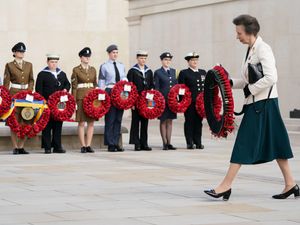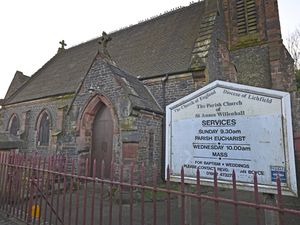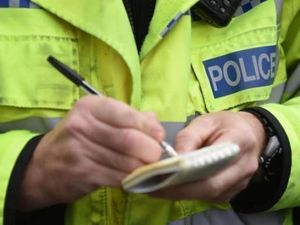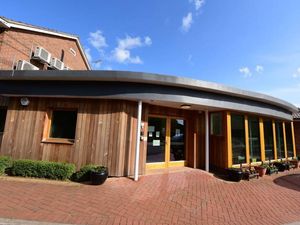Princess Royal in Staffordshire says country owes ‘debt of gratitude’ to National Servicemen
Princess Anne laid a wreath at the Armed Forces Memorial to commemorate the 395 National Service conscripts killed on active duty from 1947-63.

The Princess Royal has told an audience in Staffordshire that National Service conscripts “understood all too well the price of freedom and shouldered that burden on our behalf” at a service commemorating the two million who served.
Princess Anne was speaking to hundreds of former servicemen at an event marking the 60th anniversary of the end of National Service at the National Memorial Arboretum, near Lichfield, on Tuesday, adding “this nation owes all of them a huge debt of gratitude”.
She also laid a wreath at the Armed Forces Memorial to commemorate the 395 National Servicemen killed on active duty from 1947-63.
The event was the culmination of the national “Ask Dad” and “Ask Grandad” campaigns by the Royal British Legion (RBL) to find the “unsung heroes” of National Service.
Speaking at the service in Staffordshire, Princess Anne said: “Some thrived, others endured, but all were called upon to give up some of their time for this country and they did just that.
“As the mists of the Second World War cleared and Britain tried to forge a new future, these men were stationed across the globe and also here at home.
“Some saw active duty while others did not. But they understood all too well the price of freedom and shouldered that burden on our behalf.
“All were prepared to step forward and serve our country when we needed them. We recognise that this nation owes all of them a huge debt of gratitude for that service.
“If I may, on behalf of the entire country, take this opportunity to thank them all.”
National Service saw more than two million men aged between 17 and 21 conscripted. No women were made to serve.
Hundreds of thousands of servicemen are estimated to still be alive, aged between 80 and 97.
Conscripts had to serve for 18 months, which was extended to two years during the Korean War, before becoming a reserve for four years.
An average of 150,000 men were conscripted every year, but some were exempted due to their professions.
While many served in the UK, tens of thousands were stationed worldwide, including in Iraq, Korea, Egypt, India and Germany.
Conscripts experienced frontline combat in conflicts including the Suez Crisis, and the wars in Korea and Malaya.

The RBL says it was not unusual for demobbed servicemen to immediately return to their job they left two years earlier, which was legally required to be kept open for them.
This meant many did not reflect on or discuss their experiences, causing them to slip out of public consciousness.
Peter Backlog, 86, signed up for National Service aged 18 in 1955 and “really enjoyed it”, before joining the Royal Marines Reserves, leaving as a Major in 1983.
He said: “Once a Marine, always a Marine. I think it taught us to never give up, and that takes you right through civilian life.
“It also teaches you timing. Never be late, never be early, so I annoy my grandchildren by being furious if they’re more than five minutes late or five minutes early.”

During his service, Mr Backlog, who now lives in Fareham, Hampshire, fought in the Suez Crisis as part of Operation Musketeer and received the Naval General Service Medal.
But he did not believe it would ever return, adding: “It became normal to do National Service. Nowadays, without National Service, would it come back? No.
“I don’t think the ‘snowflake’ generation would put up with it, and nor should they.
“What’s the point in training people to shoot other people, unwillingly? It wouldn’t work.”
Mr Backlog met Ray Harrington, 87, in 1962 while training for the Special Boat Service – the special forces unit of the Royal Navy – and the pair have remained friends ever since, continuing to meet up.
They also completed their jungle warfare training with Paddy Ashdown – who went on to become the leader of the Liberal Democrats – in Malaysia.
Mr Harrington, from Flint Mountain in North Wales but originally from Liverpool, served in Germany after starting his National Service in 1953 and stayed in the military as a reservist for a further 37 years.
He said: “National Service is completely forgotten. The majority of people don’t even know what National Service was.

“When you went on National Service, it changed your life completely, because you had regimental restrictions on you and you did what you were told.”
The service, led by the actor Robert Powell, included readings, performances from a choir and buglers and films, followed by a rendition of The Exhortation and the Last Post and a two-minute silence, before a Spitfire flypast.
Philippa Rawlinson, director of remembrance at the RBL, said: “We are proud to be recognising this unique generation of today – men who were called away from their everyday lives, their jobs, their families, their partners, to do something extraordinary and serve their country.
“This event at the National Memorial Arboretum acknowledges the service, bravery and sacrifice of the two million men who were conscripted into National Service.
“Many of the men who completed National Service played down the fact that they served their country and haven’t really talked about it in the years that have passed.
“Today will give them the opportunity to share their memories, meet others with similar experiences, remember the fallen and for all of us to mark an important moment in history.”





